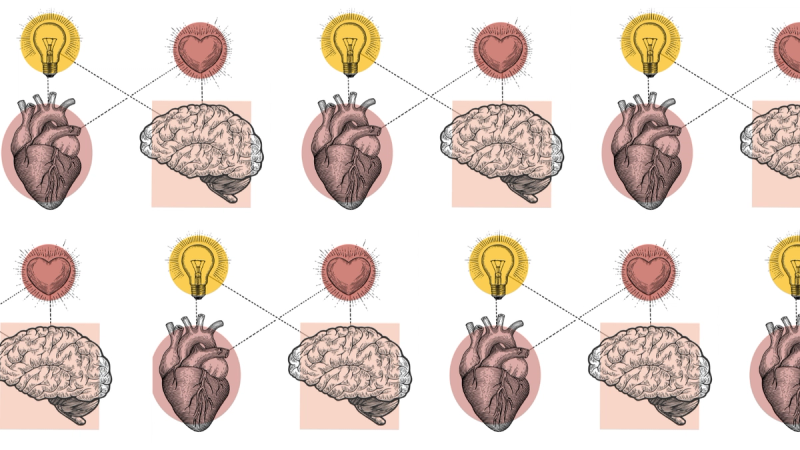Life is filled with choices. Some are as mundane as paper or plastic, while others are more serious, like the friend who insists, “You’re either with me or against me.” We are told that we must choose between success or happiness, hard work or a social life, science or art, being an extrovert or an introvert. It’s this or that. Some Christians would add that you must choose between your head and your heart. It reminds me of the Tin Man in The Wonderful Wizard of Oz who said to the Scarecrow, “But once I had brains, and a heart also; so, having tried them both, I should much rather have a heart.” The Tin Man apparently considered the head and the heart irreconcilable rivals. Perhaps you agree.
We moderns tend to associate the heart with feeling, not thinking. Naturally, this leads some to think that our knowledge of God and our love for God are two separate things. Or that it’s more spiritual to draw insight from inward intuition than theological reflection. Must a Christian, then, choose between a religion of the intellect and of the affections?
The Bible never asks us to choose between our heart and our thinking. It never encourages the impression that the heart’s mind is somehow less spiritual than the heart’s desires or will. The Bible holds these together, cordially. It might surprise many Christians to hear that according to Scripture, if your heart principally does one thing: it thinks. Let’s explore how Scripture regards the heart and its functions.
The Heart’s Unity and Its Complexity
The Bible uses the word heart more than any other word to describe our inner person (far more than words like soul and spirit). Summarizing the teaching of Scripture, we can say the heart governs the totality of our inner self—everything we think, desire, and choose flows from this one source. It is the fountainhead of every spiritual faculty within us—the spring of every motive, the seat of every passion, and the center of every thought. Your heart is the helm of your ship. The bearing it sets is the course your life will follow. That’s why the Bible interconnects your speech, repentance, faith, service, treasure, obedience, worship, walk, and love with “all your heart.” Put simply, the Bible speaks of your capacity to think, desire, feel, and choose as centered in your heart.
Within this central unity of the heart, however, the Bible also describes a threefold complexity of functions: the mind, the desires, and the will. To put this another way, the heart includes what we know (our intellect, knowledge, thought, intentions, ideas, meditation, memory, imagination), what we love (what we desire, want, seek, crave, yearn for, feel), and what we choose (whether we will resist or submit, whether we will say “yes” or “no”).
The biblical language of the heart, therefore, beautifully brings together this cooperative network of our intellect, affections, and will. This complex unity of the heart has been foundational to my own Reformed theological tradition in both its scholarly and popular forms. As a consistent biblical paradigm, it has also proven itself over time and has been confirmed by contemporary scholarship. Thus the word heart in Scripture is simple enough to reflect our inner unity and comprehensive enough to capture our inner threefold complexity.
The Heart’s Desires
Whether pursued righteously or sinfully, the heart desires companionship, security, encouragement, happiness, comfort, and satisfaction. The word used throughout the Bible for lust, fleshly passion, and worldly desire is the same word Jesus uses to express his desire to eat the Passover with his disciples. The term Paul uses for the desires of the flesh is the same one he uses for the desires of the Spirit (Gal. 5:16–17). Desires become sinful only when their object is out of bounds or the desire itself is out of balance. But all desires are strong cravings—hungry and thirsty spiritual appetites. We desire not simply what we like but what we love—what Christ calls our treasure (Matt. 6:21). We get emotional about our treasure. That is why Scripture associates the heart with feelings like anger, joy, envy, rage, anxiety, longing, sorrow, lovesickness, anguish, despair, and many other emotions (depending on whether our desires are satisfied, frustrated, or denied). Our hearts go out to what we love, and in this way our desires bring out what lies at the core of who we are.
The Heart’s Will
Often when the word heart appears in Scripture, its volitional function is in view: not only what we want but what we choose. The will decides whether we resist or submit to what we desire. Will my heart say yes or no? The battle for control of the heart is fought in the will. Which way the battle goes corresponds with the will’s strength or weakness, its callousness or brokenness, its being hardened by sin or made new by grace. The unbelieving heart’s sinful will is a stubborn, unyielding “heart of stone”—like Pharaoh’s hardened heart that resists God in rebellion. At the same time, this will is weak, unable to resist temptation. It is enslaved, unstable, apathetic, and afraid. The Christian’s heart made new by the Spirit, in direct contrast, enjoys a will that is both surrendered and strengthened. While always imperfect in this life, it nevertheless increasingly bows before God, grieves over sin, and serves Christ with humility. That same renewed heart has resolved to obey the Lord and is emboldened to die to sin, defy the world, and resist the devil. Your heart does not simply know or desire; it decides.
The Heart’s Mind
Finally, according to the Bible, the third function or capacity of the heart is to think. Let’s spend a little more time on this one, since we’re so used to thinking about thinking with our heads. You will not find biblical references to your head as the locale for your thinking. Human knowledge, wisdom, plans, ideas, meditation, imagination—along with confusion, ignorance, and folly—are all lodged in the heart. For example, Paul prays for the Ephesians, “May [God] give you the Spirit of wisdom and of revelation in the knowledge of him, having the eyes of your hearts enlightened” (Eph. 1:17–18). The heart can receive the light of God’s truth just as it can be blind and suffer confusion or doubt. “Out of the heart come evil thoughts,” Jesus says (Matt. 15:19). The heart is where our knowledge resides: “I will give them a heart to know that I am the Lord” (Jer. 24:7). Simeon prophesied that through Jesus’ birth the “thoughts from many hearts” would be revealed (Luke 2:35). The cynicism of the religious leaders sprang not from within their brains but from within their chests: “But Jesus, knowing their thoughts, said, ‘Why do you think evil in your hearts?’” (Matt. 9:4; Mark 2:6). Psalm 139:23 and Proverbs 3:5 draw the parallel succinctly: “Search me, O God, and know my heart! Try me and know my thoughts!” and “Trust in the Lord with all your heart, and do not lean on your own understanding.”
In Genesis 6:5, the thoughts of the heart are on appalling display: “The Lord saw that the wickedness of man was great in the earth, and that every intention of the thoughts of his heart was only evil continually.” The word of God speaks to the heart’s mind: “For the word of God is living and active, sharper than any two-edged sword, piercing to the division of soul and of spirit, of joints and of marrow, and discerning the thoughts and intentions of the heart” (Heb. 4:12). Our Lord assumed the same when he explained why he speaks in parables: “For this people’s heart has grown dull, and with their ears they can barely hear, and their eyes they have closed, lest they should see with their eyes and hear with their ears and understand with their heart and turn, and I would heal them’” (Matt. 13:15; cf. Isa. 6:9–10).
English versions of the Bible often translate “heart” with words like understanding, sense, or, most often, mind. When the words heart and mind appear together in Scripture—as they often do—it shows that they are friends, not rivals. When you read the phrase “lacks sense” in the book of Proverbs, the literal phrase is “lacks heart.” It should not surprise us, then, that the Bible’s wisdom literature (especially the book of Proverbs) contains the highest concentration of occurrences of the word heart. These examples are only a small sample of the many places and ways that prove what Princeton theologian B. B. Warfield observed: that “the heart is the cognitive faculty in Scripture.”
The Heart’s Complex Unity in Action
To appreciate how the heart thinks, we need to remember that the mind, desires, and will form a unity. What we know, desire, and choose are not independent but in league. For example, our desires relate to what we know; we are capable of careful reasoning but not capable of dispassionate reasoning. We study most diligently what we love most dearly—whether good or bad. Healthy thinking is likewise connected to healthy desires and choices. A sick heart is a deceived heart (Jer. 17:9). When our desires are impure, so is our reasoning (Eph. 4:18; Rom. 1:21–22). When our hearts are renewed, we see and choose more clearly and wisely (Matt. 13:16). This is by God’s design. It is often supposed that strong feelings will only confuse our thinking. That can be true, but not always. Sometimes a burning, righteous zeal brings clarity and purpose. Passion arises to dislodge our apathy, and we finally jump into action because our heart can no longer take the distress.
We also see the connection between the mind and the rest of the heart in the ways our thinking is hopelessly entangled with our sinful desires and choices. A heart given over to impurity and rebellion can no longer sustain sound judgment. The roots of our reasoning reach down into the character of our heart. This is Paul’s reasoning in the first chapter of Romans: because the unbelieving heart has given itself to idolatrous and debased desires, it suppresses the truth and is itself given over to darkened, foolish, futile, and deceitful understanding. A deviant heart leads to a devious heart. As John Donne wrote in his Holy Sonnet 14,
Reason your viceroy in me,
me should defend,
But is captive’d, and proves
weak or untrue.
When the heart is captivated by an illicit love, it will not listen to holy counsel, let alone common sense.
Similarly, we cannot speak of the mind’s thinking in abstraction from the heart’s will. The Reformers understood this well (as did Augustine before them). Martin Luther and John Calvin argued that a calloused heart does not see, does not believe, and does not freely choose God. This is of course what Paul meant when he wrote, “For the mind that is set on the flesh is hostile to God, for it does not submit to God’s law; indeed, it cannot” (Rom. 8:7). The heart’s thinking takes up an alliance with the heart’s choosing. The hardened heart is not just unfeeling; it is unbelieving.
Scripture unfolds this relationship between the mind and the will within the heart by asserting that our reasoning is not restricted to the content of thought; it also involves the direction of our thinking. For example, Paul writes, “For those who live according to the flesh set their minds on the things of the flesh, but those who live according to the Spirit set their minds on the things of the Spirit” (Rom. 8:5). Your thoughts flow in the same direction as your life. The activity of your thinking is also the movement of your will. Our Lord assumed the same pattern of concerted thinking and willing when he rebuked Peter: “Get behind me, Satan! You are a hindrance to me. For you are not setting your mind on the things of God, but on the things of man” (Matt. 16:23). Jesus’ concern was not with a random thought from Peter, but with the whole orientation of Peter’s thinking. The will of the heart expresses itself deliberately in the thoughts we consciously entertain, in the desires we intentionally inflame, and in the directions we persistently chase.
We do not have to choose between aiming for the head or the heart. That is a false choice. The heart is where all thoughts live and move and have their being. And this is a good thing. It is how God designed us—and our salvation requires it.
The Heart’s Mind Renewed
To be born again means that God has given each of us a new heart. Just as every function and aspect of our old heart was perilously infected by sin, so also nothing in our new heart remains untouched by God’s grace—including our mind. God has graciously enlightened our understanding. Now we see our sin and we see its remedy in Christ so that we might call on the Lord with “a pure heart” (2 Tim. 2:22). God’s grace and truth shine “in our hearts to give the light of the knowledge of the glory of God in the face of Jesus Christ” (2 Cor. 4:6). This light does not bypass the mind. It opens the mind. Our hearts are full of saving belief, trust, love, confession, and salvation. We trust in Christ with our mind, with the assurance of a resolved will and the delight of renewed desires.
But this is just the beginning. There is so much more to learn. Our minds are transformed by the renewal that such knowledge brings (Rom. 12:2). With it arises more love for Christ, along with the strengthening of our will to follow him. This knowledge matures into a wisdom that makes right spiritual judgments and takes every thought captive in obedience to Christ (1 Thess. 5:21; 1 Cor. 2:15; 2 Cor. 10:5). God’s grace and truth penetrate the believer’s mind and raise it to its noble reward of entering into sweet communion with the living and true God, who promised, “They shall all know me” (Jer. 31:34).
The touchstone of what makes for true knowledge is that it leads us toward, not away from, an intimate whole-heart relationship with God. It brings us to him who is the depth of life, love, joy, and peace. This present life gives us days of small beginnings, but they are not to be despised. They lead to the eternal day. The light of God’s truth and grace has flooded our hearts and will lead us into the glorious presence of our God. He is the promised reward for those who look to Christ in faith, the One who committed all his thinking, desiring, and willing to his Father and to us in saving devotion. Then it will be clear (as it should be now) that we do not have to choose between knowing him and loving him and choosing him when we give him all our heart.
Footnotes
Matthew 6:21; Luke 6:45; Deut. 30:2; 1 Sam. 7:3; Jer. 24:7; Prov. 3:5–6; 4:23; Deut. 10:12; Pss. 86:12; 119:34; Isa 38:3; Matt. 22:37.
BackGenesis 6:5; Pss. 19:14; 49:3; 77:6; 139:23; Prov. 15:14, 28; Matt. 5:19; Luke 2:19; 6:45; Rom. 10:9; Eph. 1:18; 4:18; Heb. 4:12; 8:10.
BackNumbers 11:4; 1 Sam. 2:16; 23:20; Ps. 106:14; Deut. 12:15; Pss. 45:11; 132:13; Isa. 26:9; Matt. 5:28; Gal. 5:24; 1 John 2:16–17; Matt. 13:17; Luke 22:15; Acts 20:33; Rom. 1:24; 6:12; 7:7; 13:9; Col. 3:5; 1 Tim. 6:9; 1 John 2:16.
BackJohn Freeman, Hide or Seek: When Men Get Real with God about Sex (Greensboro, NC: New Growth, 2014), 16.
BackPsalm 63:1; Isa. 55:2; Matt. 5:6; John 4:10; 6:32, 48, 55; Heb. 5:14; 1 Pet. 2:2.
BackEzekiel 36:26; 2 Chron. 36:13; Ezek. 3:7; Acts 19:9; Rom. 2:5; cf. 11:7; 2 Cor. 3:14; Exod. 4:21; 7:3, 13, 14, 22; 8:15, 19, 32; 9:7, 12, 34, 35; 10:1, 20, 27; 11:10; 14:4, 8, 17.
BackGenesis 42:28; Deut. 1:28; 20.8; Josh. 2:11; 2 Sam. 17:10.
BackIsaiah 66:2; 2 Cor. 7:10–12; Matt. 5:4.
BackJudges 8:21; 1 Sam. 2:1; 1 Chron. 22:19; Ezek. 40:4; Dan. 1:8; Acts 4:13; James 4:7; 1 Pet. 5:9.
BackDeuteronomy 28:28; Luke 24:38; Matt. 13:15; Mark 2:6; Prov. 15:14.
BackPsalm 26:2; 64:6; Jer. 17:10; 20:12; Matt. 22:37 (Mark 12:30; Luke 10:27).
BackExodus 14:5; 1 Kings 3:9; Prov. 19:21; Dan. 2:30.
BackProverbs 7:7; 9:4, 16; 10:13; 11:12; 12:11; 15:21; 24:30; 6.32; 9:16; 11:12; 12:11; 15:21; 17:18; 24:30.
BackB. B. Warfield, The Works of Benjamin B. Warfield, vol. 9, Studies in Theology (1932; rprt., Grand Rapids: Baker, 1991), 464–65.
Back







